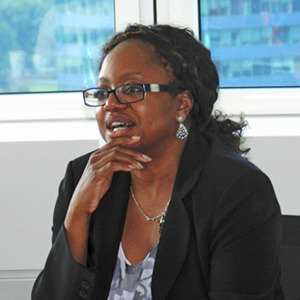

On 28 May 2013, VCDNP hosted a seminar featuring Ambassador Bonnie D. Jenkins, Coordinator for Threat Reduction Programs, US State Department, on the contributions of various stakeholders at the national and international levels to the Nuclear Security Summit process and, more broadly, to strengthening the global nuclear security regime. Amb. Jenkins discussed the Unites States' preparation for the 2014 Nuclear Security Summit, such as continuing an outreach effort to other regions and initiatives by other US government agencies that contribute to international efforts to secure vulnerable nuclear material around the world.
Amb. Jenkins highlighted achievements of the 2010 Nuclear Security Summit in Washington and the 2012 Summit in Seoul and emphasized the progress made in addressing the threat of nuclear terrorism. She emphasized that, despite the success of these two summits, nuclear security remains an enduring responsibility of all nations as long as such materials exist; she further opined that securing all vulnerable nuclear material requires a multi-sectorial approach engaging various stakeholders—national governments, international organizations, nongovernmental organizations (NGOs), think thanks and research institutes, as well as the industry and the private sector. She encourages each of these players to fully commit to enhancing security culture and to maintain robust communication and coordination of their activities in this field.

While emphasizing the integral role of international organizations such as the International Atomic Energy Agency (IAEA), Interpol, and relevant UN agencies, Amb. Jenkins also lauded the important role of NGOs, which work to promote awareness among civil society, provide critical reviews and analysis, and promote specific policies and solutions with their respective governments. In this sense, she brought forward the important work conducted by the Nuclear Threat Initiative, the Fissile Material Working Group, and the World Institute for Nuclear Security.
Among the US priorities for the 2014 Summit, Amb. Jenkins highlighted the need to continue strengthening the global nuclear security architecture, particularly the role of the IAEA. She underlined the importance of fulfilling commitments from previous summits, as well as identifying tangible outcomes for 2014. She says it is worth pursuing new concepts like providing international "assurances" of nuclear facility security as part of a possible post-summit process to measure progress and global confidence in security arrangements. The ratification and entry-into-force by 2014 of the Amended Convention on the Physical Protection of Nuclear Materials and the ratification of the International Convention for the Suppression of Acts of Nuclear Terrorism continues to be a US priority.

During the question and answer session, the audience discussed the agenda for the 2014 Nuclear Security Summit, which will be held in The Hague. A representative from the Netherlands provided information on the key priorities presently debated by the members of the summit Sherpas' (or high-level experts) group. Among them are: 1) achieving ratification of the Amendment to the Convention on the Physical Protection of Nuclear Materials by the remaining thirty states required for its entry-into-force; 2) enabling industry and governments to work closer together; 3) increasing focus on the security and management of radioactive sources; 4) developing the concept of "assurances" and what it represents for different states; 5) promoting peer and IAEA reviews of nuclear security arrangements.
In response to a question Amb. Jenkins mentioned that there are different preferences regarding the possible continuation of the summit process after the 2014 meeting. At this point, however, no specific decision on this issue has been taken. The decision about the future of the summit process will be part of the agenda of the upcoming 2013 Sherpa's meetings. She reiterated the importance of the IAEA's role in the summit process, noting that the coming IAEA Conference on Nuclear Security, scheduled for July 2013, will certainly generate a series of discussions that will be very useful for future Sherpas' meetings and the 2014 Nuclear Security Summit.

By continuing to use the site, you agree to the use of cookies. more information
The cookie settings on this website are set to "allow cookies" to give you the best browsing experience possible. If you continue to use this website without changing your cookie settings or you click "Accept" below then you are consenting to this.